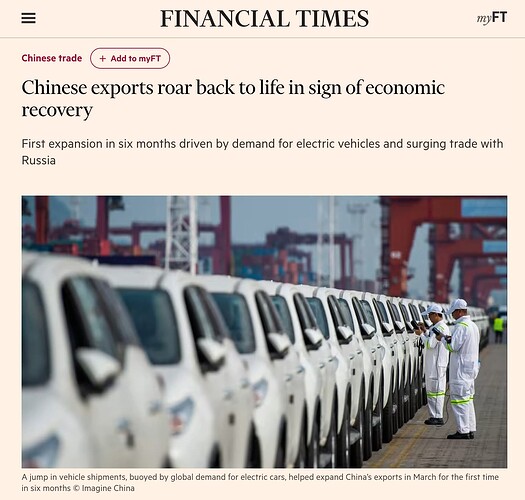-
中国经济的出口引擎已经恢复了活力,并且正在帮助中国政府实现今年5%的增长目标。
-
3月份的出口激增15%,电动车、零部件的销售以及与俄罗斯的贸易帮助推动了出口的扩张。
-
这是出乎意料的,因为经济学家曾预测会收缩7%。
-
由于大流行病的影响,制造业产出一直很疲软,而消费增长也不平衡。
-
对俄罗斯和东南亚国家,如越南、新加坡和马来西亚的出货量急剧增加。
-
这导致中国第一季度的GDP数据有一些上行风险。
-
进口表现也超出了预期,收缩了1.4%,而预期为5%。
-
中国政府已经采取措施促进外贸的稳定。
-
尽管最近出现了增长,但由于全球需求疲软和金融风险,分析师仍然预计出口将下降3%。
-
The export engine of the Chinese economy has come back to life and is helping Beijing reach its growth target of 5% this year.
-
Exports surged 15% in March, with sales of electric vehicles, components, and trade with Russia helping to drive the expansion.
-
This was unexpected, as economists had predicted a contraction of 7%.
-
Manufacturing output has been weak due to the pandemic, while consumption growth has been uneven.
-
There was a sharp increase in shipments to Russia and south-east Asian countries, such as Vietnam, Singapore and Malaysia.
-
This has led to some upside risk for China’s first-quarter GDP figures.
-
Imports also outperformed expectations, with a 1.4% contraction compared to an expected 5%.
-
The Chinese government has taken steps to promote stability in foreign trade.
-
Despite the recent growth, analysts are still expecting a 3% decline in exports due to weak global demand and financial risks.
